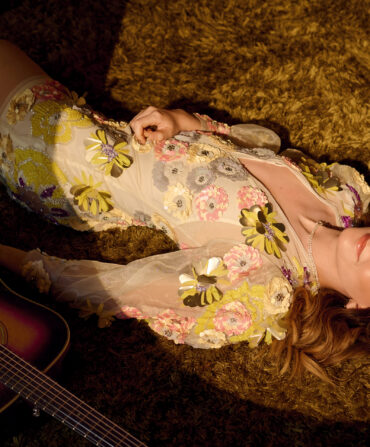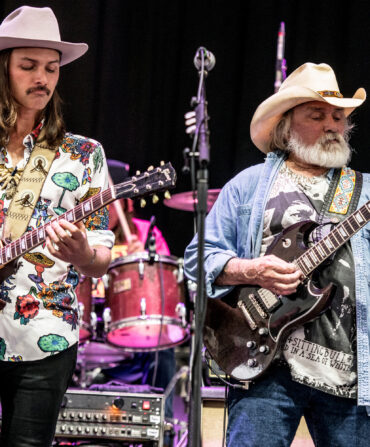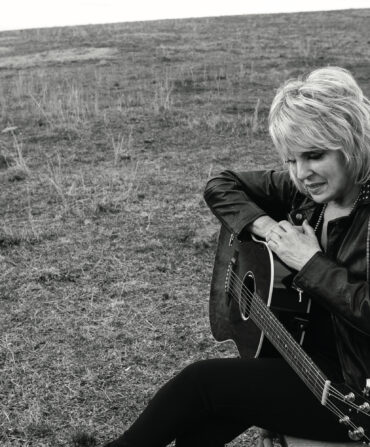Music
Eric Church’s Tennessee Sanctuary
The Country Music Association’s reigning Entertainer of the Year has never quite fit the superstar mold. The North Carolina native finds his peace—and inspiration—amid 1,800 acres of Tennessee hills
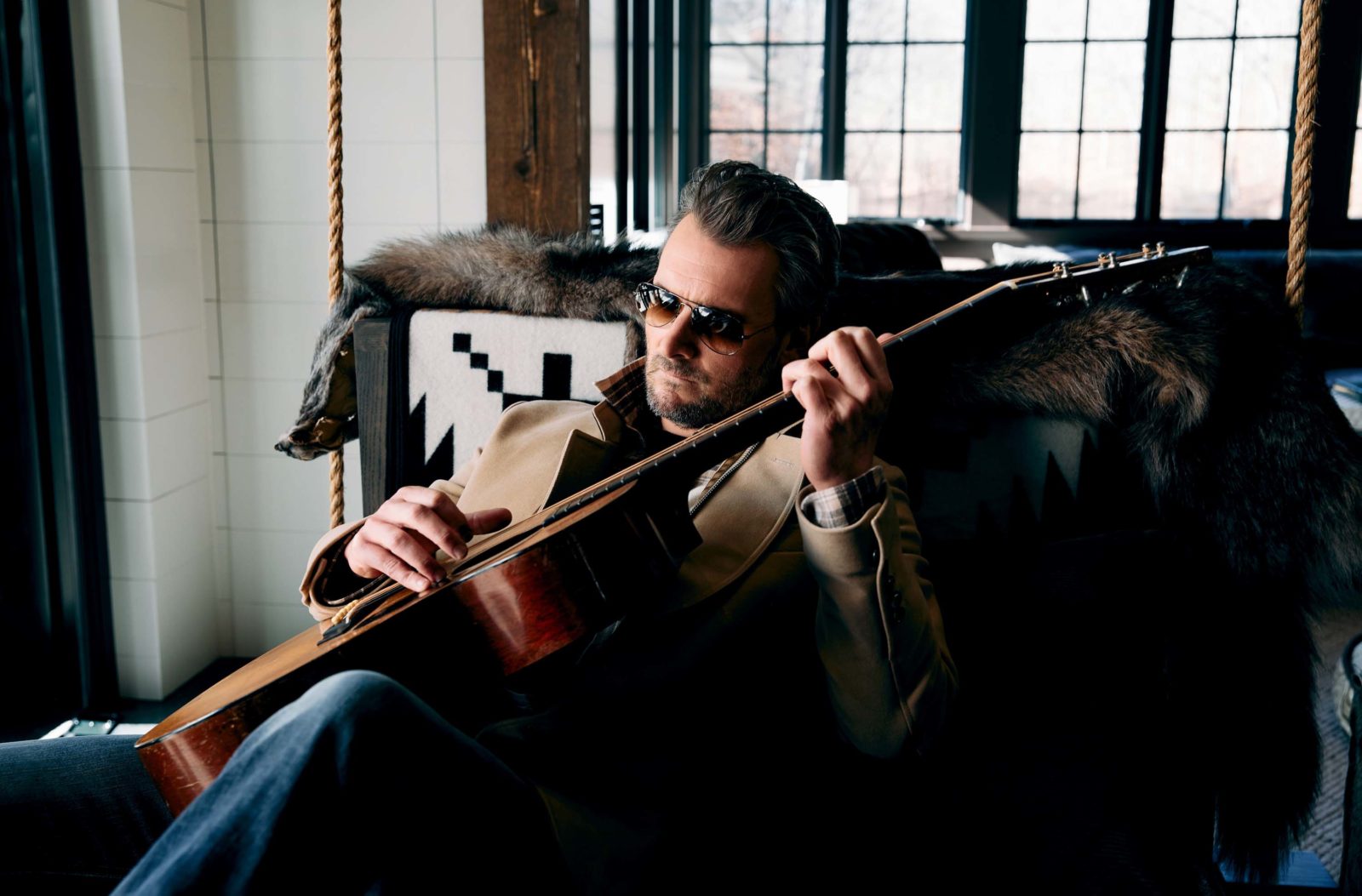
Photo: RObby Klein
Church with a 1933 Martin guitar at his cabin outside Nashville.
Sitting on a rocking chair on the deck of his lakeside cabin, Eric Church raises his finger to his mouth and then points in the distance. His property is only twenty minutes from the din of Nashville, yet the silence is deafening. There’s the faintest whoosh, whoosh as a blue heron sails over the sparkling blue water. In some Native American traditions, the blue heron symbolizes self-reliance and the ability to evolve with wisdom and determine life’s outcome via the circumstances you create. That’s also an apt description of how Church has shaped his career. His stubbornness and conviction are the stuff of legend on Music Row, beginning with his 2006 debut, Sinners like Me, through five more studio albums, selling close to eight million copies and garnering more than eight billion streams. Last November, he finally won the coveted Entertainer of the Year award from the Country Music Association after years of losing out to the likes of Garth Brooks and Luke Bryan. “It’s just a trophy,” he says. “But I’d be lying if I said it didn’t matter given all the work we’ve done.”
It’s never “I” or “mine” with Church; it’s always “we” or “our.” “I’m just the brand, the Tide on the shelf,” he says. “It’s up to others to sell me.” He maintains a tight circle. His band has been with him for years, while his longtime manager, John Peets, and his wife, Katherine—whom he met eighteen years ago at the Nashville music haunt Exit/In—are the primary orchestrators behind the scenes. He’s a superstar hiding in plain sight. He rarely does interviews (“Just doesn’t like ’em,” Peets says) and seems to have little interest in the celebrity brand-extension machine, passing on opportunities to appear on The Voice or American Idol and rarely venturing out in public without his trademark Ray-Bans.
Today, though, on a sunny, mild winter afternoon, things are relaxed. Wearing a black fleece jacket, black athletic pants, and white running shoes, Church, who is forty-three, leans back in the chair while sipping a Michelob Ultra. His hair is pandemic shaggy. There’s some gray in there. His brown eyes are piercing and serious, but he lights up when talking about his boys, nine-year-old Boone and Hawk, who is six. Balto, the family’s rescue mutt, scurries around close by. A sitting area in the cabin holds a trophy case of guitars, including Waylon Jennings’s original Martin and a 1933 Martin acoustic that Keith Urban gave him for Christmas after recording a track Church had cowritten, “We Were,” in 2019. The two went on to release a duet of the song. “I texted him and said I couldn’t accept it, it’s too much,” Church says modestly. “But Keith told me, ‘Keep it and write us another song.’”
In April, Church will release Heart & Soul, a triple-album opus recorded in a frenzied month-long session that wrapped just before the pandemic hit. He’s put out several songs from it since then, but with his massive tour schedule on hold, he’s spent much of his time here at the cabin. It sits on 1,800 acres with miles of trails for hiking or four-wheeling, and not one, but two man-made lakes stocked with largemouth bass that Church says should be right around five pounds by the time the weather warms. “That’s a good-sized bass,” he says with a mischievous grin. “But I want the state record, which is fifteen.” Church grew up in Western North Carolina fishing with his grandfather, and now he and Boone spend hours fishing on the lake during weekends and the summer. Finishing his beer, he walks the gravel path to the boathouse, where two handmade wooden boats with trolling motors sit inside. The craftsmanship is exquisite, the work of MC Lipscomb, an eighty-year-old builder in Virginia. Church really wants a Jet Ski, but Katherine won’t let him get any gas-powered water toys; even the family pontoon boat is electric.
Since first beginning work on the property in 2011, Church has poured no small amount of resources into it, carefully clearing out huge swaths of hackberry trees and overgrown brush for the lake beds and shoreline. The project required a permitting process, and work halted for a time because of a protected species of salamander on the land. It’s been a long labor of love. “Here’s what’s great,” he announces. “I can’t tell you what the filter is on how I write songs, but there are many times I’m on a boat in the lake and that’s where I find clarity.”
Church has always relished spending time outdoors. His grandfather—nicknamed Chief because he was the head of the police department in Granite Falls, North Carolina—had a hundred acres where, as kids, Church and his younger brother, Brandon, and sister, Kendra, would romp around. His father worked in the furniture business and traveled often, while his mother taught kindergarten. He grew up on AC/DC and classic rock and wrote his first song when he was thirteen. By the end of high school, he was playing gigs at local venues in a band with his brother. The audiences could be boisterous. Sometimes fights broke out. At the end of a set one night, Church finally told the raucous crowd to write down the songs they wanted to hear, and he’d come back the next week and play. He learned them all.
He went to college at Appalachian State and continued with the band, sometimes pulling in as much as $1,000 per night playing covers. But when he snuck in some of his own material, the crowd was bouncing off the walls. “Something was happening,” he recalls. “I could see it with my own eyes.” He graduated with a degree in marketing, but Nashville beckoned. His father agreed to pay his rent for six months, and if it didn’t work out, he’d come back and work in the furniture business. That’s almost what happened. “I had been rejected all over town, and I was sitting in my truck listening to Kris Kristofferson’s The Austin Sessions,” he remembers. “I called my brother to come downtown and get drunk with me.” The next day, bleary-eyed and hung over, he got a call from the independent music publisher Arturo Buenahora Jr. to come in and sing. Buenahora signed him after hearing one song, “Lightning.” He and Church have been partners ever since, eventually forming their own publishing company, Little Louder Music.
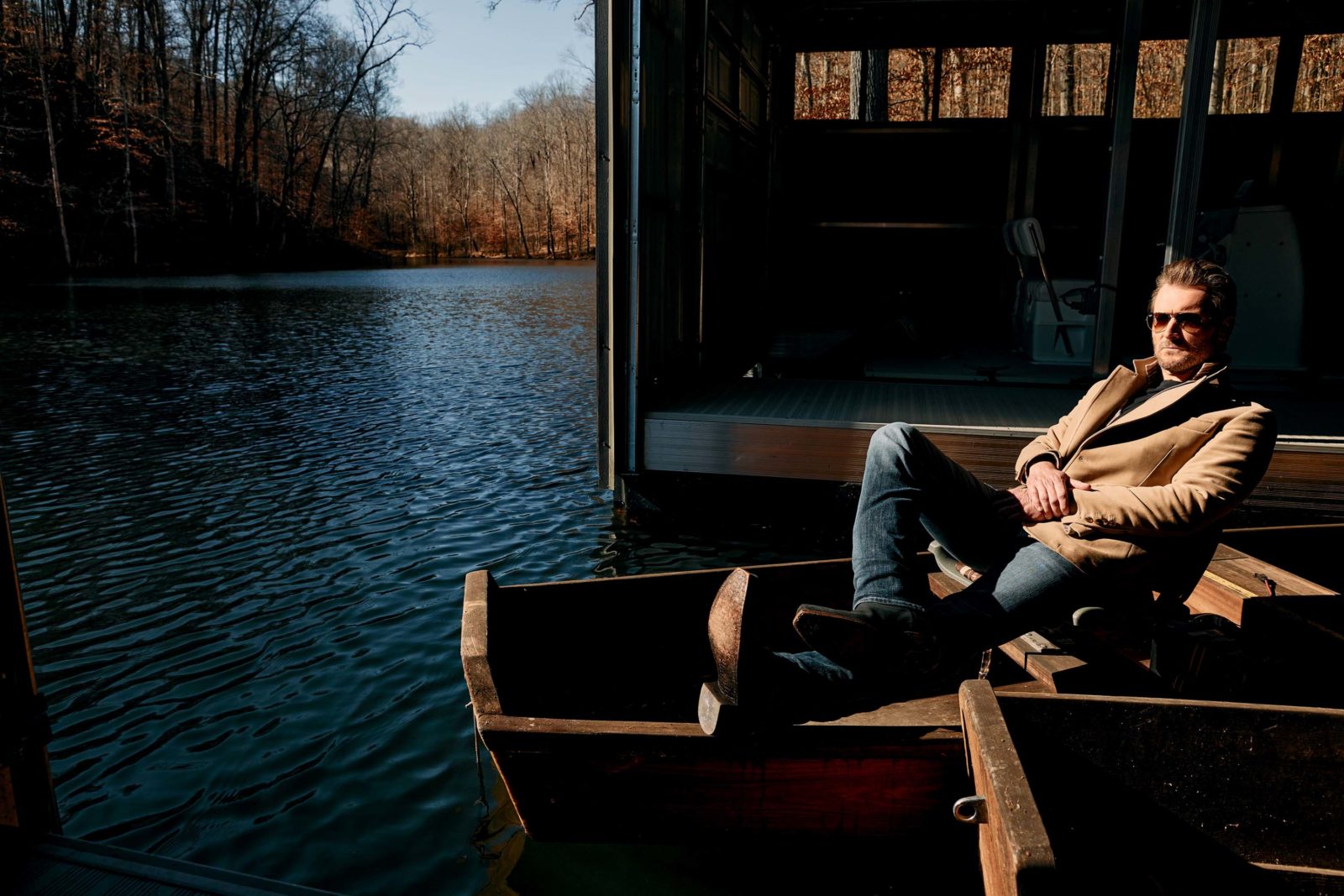
Photo: RObby Klein
One of the two lakes Church built, stocked with largemouth bass.
After two modestly successful albums, Church broke through with 2011’s Chief (named for his grandfather). It produced his first two number-one singles, including the hit “Springsteen,” a sweet eighties-nostalgia-soaked love song that isn’t really about the Boss (but Bruce was a fan of the track anyway, writing a nice note to Church that he says “just blew me away”). While he shies away from public view, he’s unafraid to share intimate details of his life with his fans. His songs are heartfelt and vivid, with nuanced, granular lyrics that avoid bumper sticker sloganeering. Aside from Miranda Lambert, no one else does that with such aplomb in mainstream country music. His 2015 song “Three Year Old,” for example, inspired by Boone, contains the line “A garbage can is a damn good spot to hide truck keys.” Who can’t relate to a toddler’s mischievous antics? “He writes songs at a John Prine level,” says the singer Maren Morris, a longtime fan. “It’s inspiring to see someone never waver from who they are.”
In a musical genre that places particular importance on interaction with fans, Church takes it to the extreme. His most recent tour featured three-hour marathon concerts, with Church playing two nights in each city and always changing up the set lists (something he gleaned from his love of the Grateful Dead). In 2015 he surprised members of his fan club, the Church Choir, with vinyl copies of his Mr. Misunderstood record before anyone else had heard it. Not even his label knew until the day before. To keep it all hush-hush, Church bought a record pressing plant in Germany to manufacture the album. He still owns it.
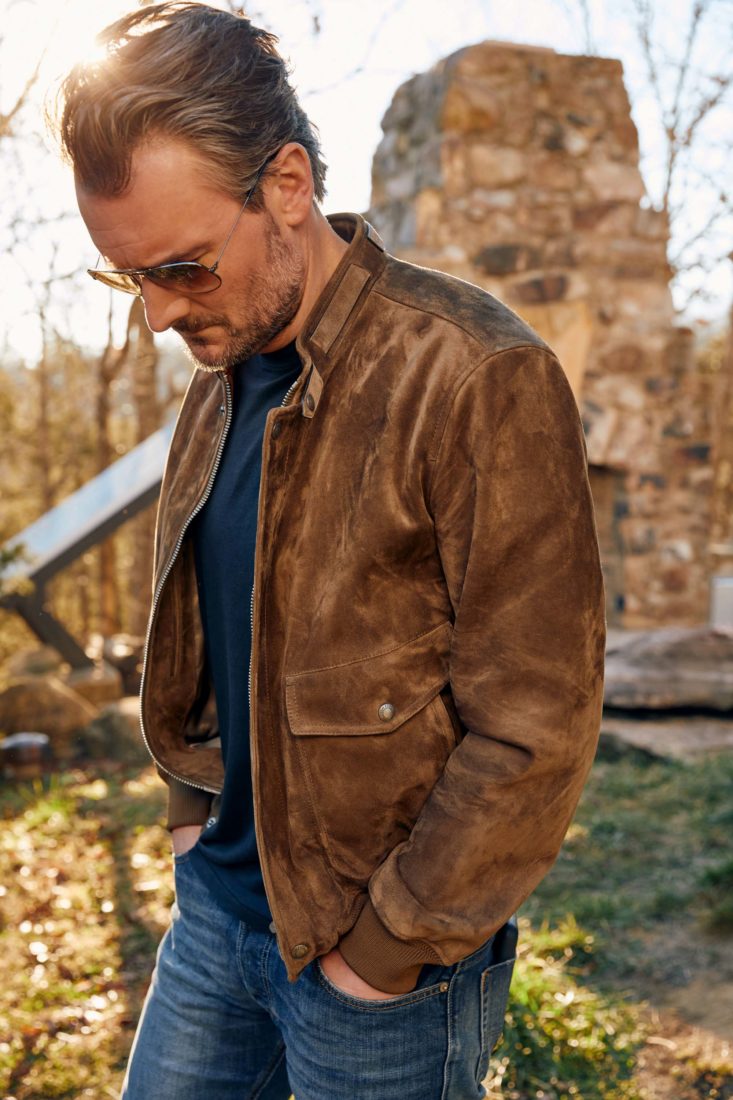
Photo: RObby Klein
Church on the property near the silo, where he has cookouts with his sons.
Church recorded much of his previous work at producer Jay Joyce’s studio in East Nashville. But while working on 2018’s Desperate Man, he felt those familiar confines were leading to complacency. “Desperate Man was the hardest record we’ve ever made,” he says. “We had just come off a big tour, so everyone was fat and happy. I was beating my head against the wall. The hunger and edge weren’t there. I needed to change it up.” So for Heart & Soul, he wanted to thrive in chaos, to be “comfortably uncomfortable.” In January 2020, Church and crew hauled all their recording equipment to North Carolina, setting up in a restaurant in the mountains that had closed for the season. They arrived with a plan to write and record one song per day for twenty-eight days. Several cowriters shuttled in and out, but Church soon found himself alone out on a creative limb that he wasn’t sure he could get off of. “Every little thing became a song,” he says. “I was manic. I couldn’t turn it off. There were times when I didn’t sleep for days.” He would pace in his tour bus or outside in the snow until the early morning, write a song, break for dinner, record it, and do it all over again.
Katherine tried to keep tabs on him, bringing the boys on the weekends, when Church would take a half day off to try to unwind. “Toward the end he was so worn out,” she says. “You couldn’t say anything without him turning it into a song. I would hear him drift off on the phone because he was humming something or singing. It was always ‘Gotta call you back, I got a song.’” She wasn’t too worried. Katherine has a background in music publishing and had become used to dealing with mercurial artists. “I told him he had to keep going, because the songs were so damn good.”
Indeed, the twenty-eight songs he recorded (twenty-four of which appear on the albums) contain some of Church’s finest and most intimate material to date, buoyed by the synergy of everyone being in the same room during recording sessions. (Church’s secret weapon is his longtime backup singer Joanna Cotten, who normally adds her parts after Church has finished, but on Heart & Soul they play off each other with scintillating results.) The Heart portion of the project spotlights Church at his rowdy best, hewing more to the heartland rock and roll of John Mellencamp and Bob Seger—one of Church’s all-time favorites—than to most country artists. Soul is just that, with Church singing falsetto on groovy Motown-style numbers, inspired by the R&B his mother played when he was growing up. But at the end, a handful of tracks didn’t quite fit in either category. “So we decided to make an ‘And’ record,” he says. In keeping with his devotion to his fans, the & album will only be available on vinyl to Church Choir members. And he’s itching to get back on the road, something he hopes might be possible this fall. “My return on all we’ve invested is the fans. ‘These Boots’ is one of our closing songs, and everyone holds their boots in the air,” he says, referring to a track from his first album. “The world misses it, the communal thing we share. When I play a show, I have no idea what the political leanings are of my audience, but for three hours they can throw their arms around each other and all believe in the same thing.”
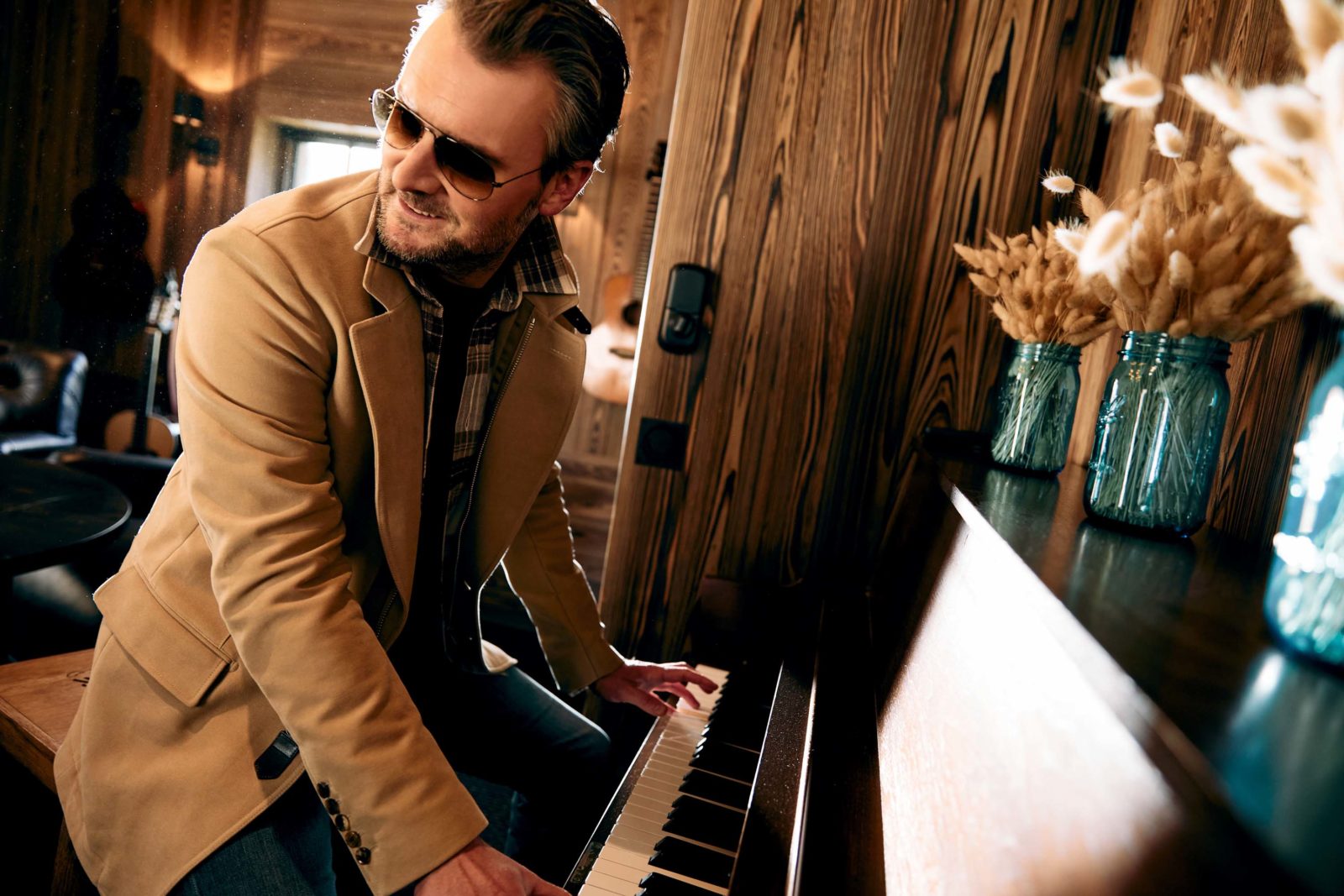
Photo: RObby Klein
The cabin holds a bevy of guitars and a piano used for the recording of Heart & Soul.
Until that time, Church has plenty to keep him occupied on the property, fishing or wielding one of his twenty-odd chain saws to work on the land. “Grab your beer,” he says. “Let’s go for a ride.” We pile into a two-seater UTV, and he guns it up into the hills, pointing out a flock of wild turkeys crossing the trail. Church doesn’t hunt, though he lets friends occasionally. (“It’s too much work to hunt. I’d rather look at ’em.”) In the distance a giant buck jumps over the path, followed by several does. Church runs these trails often, putting in six to eight miles to clear his head.
For all Church’s success, the last few years have also been trying. In the summer of 2017, he nearly died from a blood clot in his chest that required emergency surgery. Doctors had to remove one of his ribs. Then, after months of rehab, he headlined the Friday night slot at the Route 91 Harvest festival in Las Vegas, where two nights later the deadliest mass shooting in the country’s history claimed the lives of sixty people. One of the songs from Heart & Soul, “Through My Ray-Bans,” is a wistful, gorgeous tribute to his fans at the festival. Eight months later, his brother passed away suddenly. “He’d been in and out of rehab, but one day he had a seizure and dropped dead,” Church says. “Still haven’t gotten over that. Probably never will.”
His mood brightens when we stop for a look at an old moonshine still that has been there since the 1920s. “Feel how strong that wood is,” he says, grabbing the boards with both hands. Up the nearby hill is a cave where Church says the moonshiners stored their liquor. “There are all these pieces of mason jars on the ground, and that’s also where the rattlesnakes are.” He declines to venture up there to take a look. A few minutes later, we arrive at what’s known as the silo, a round building where from the second story you can see the lights of Nashville twinkle in the distance. Surprisingly, Church doesn’t come up here much. The couch cushions are still wrapped in plastic, but there’s a large firepit and grill outside, where he cooks up hot dogs for the boys. He says they might end up building a home on the property, but the house they currently live in is closer to the boys’ school. Katherine rides horses, so the next undertaking will most likely be a barn.
Church admits he hasn’t written a song since the sessions in the mountains, but he isn’t concerned. Eventually the inspiration will come, in the land and in the quiet. “The seclusion has been good for my career,” he says. “I’m not a big people guy. You’re a mile from any road, and that works for my personality. It’s been a lifesaver.”


